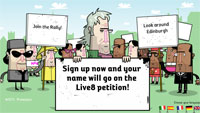 Around a hundred rural African farmers around Makuleke are testing cell phone technology that gives them access to national markets via the Internet, allowing them to compete with the big boys and boost profits by at least 30 percent.
Around a hundred rural African farmers around Makuleke are testing cell phone technology that gives them access to national markets via the Internet, allowing them to compete with the big boys and boost profits by at least 30 percent.
Previously, farmers would travel huge distances to the market in Johannesburg in the hope of selling their goods, often losing half their harvest along the way, but a new virtual trading facility installed on mobile phones lets them sell their produce direct from their small farms.
Farmers can check prices on the phone and choose to sell when prices are high or raise the selling price if demand is high – and by dealing directly with sellers, farmer can raise profits by cutting out the middle man.
“Mainstream farmers have access to market information so they can negotiate better prices. This cell phone enables poor rural farmers to get that same information,” said Mthobi Tyamzashe, head of communications at South African cell phone operator Vodacom, project sponsors.
It’s an example of how technology can bring real benefits to the world’s poorest continent, and cell phone use has already rocketed 100 percent in Africa since 2000.
 It’s believed that wireless technology is the best way to bring the Internet to the poor, as Africa’s sparsely-populated and often inhospitable landscapes make a landline infrastructure commercially unviable.
It’s believed that wireless technology is the best way to bring the Internet to the poor, as Africa’s sparsely-populated and often inhospitable landscapes make a landline infrastructure commercially unviable.
Senegalese company Manobi has already signed up 40,000 customers to their trading platform for farmers and fishermen, allowing customers to access information on a Web-based trading platform via Internet-enabled phones. Users can also request prices and make trades via SMS, or text message.
“It’s a trading platform and a business space,” said Manobi Chief Executive Daniel Annerose. “Small Senegalese farmers even linked up with the French army (on the platform) last year and agreed to supply one of their ships when it docked in Dakar.”
Manobi plans to expand the project into South Africa, followed by the rest of the continent and the Middle East, in partnership with French cell phone manufacturer Alcatel and Vodacom.
Of course, Vodacom and Alcatel aren’t investing all this cash because – like a Miss World contestant – they want to make the world a better place.
 There’s a hard business ethic at work here, with the companies keen to expand the cell phone market into rural areas and grab new customers before the competition steps in.
There’s a hard business ethic at work here, with the companies keen to expand the cell phone market into rural areas and grab new customers before the competition steps in.
“The idea is that if people start off with your product they will stay with it once they become more profitable clients,” said Vodacom’s Tyamzashe.
The company dished out 360 starter packs and airtime vouchers worth 300 rand each, while Alcatel has handed out 200 handsets, although there are questions as to the long term viability of the scheme – farmers often living on less than a dollar a day may not be able to afford the luxury or surfing the Web on their phones once free airtime runs out.
“Individual projects like this may not be sustainable, but in a wider context it is an important part of getting telecoms out to the rural areas,” said telecommunications expert Arthur Goldstuck, from research group World Wide Worx.
“It is a case of throwing all kinds of things at the wall and hoping that some of it works.”
Hi-tech cell phones help Africans trade crops
 It can be a confusing life for protesters keen to voice their opinions at the G8 meeting in Gleneagles.
It can be a confusing life for protesters keen to voice their opinions at the G8 meeting in Gleneagles.
 All those signing up will have their names added to the online petition, the Live 8 list, which is being sent directly to the G8 leaders.
All those signing up will have their names added to the online petition, the Live 8 list, which is being sent directly to the G8 leaders. The European Parliament has voted overwhelming against a controversial bill that might have led to software being patented.
The European Parliament has voted overwhelming against a controversial bill that might have led to software being patented. The bill was supposed to get rid of individual EU nations’ patent dispute systems and replace it with a common EU procedure. Instead, the old system of patents being handled by national patent offices will continue, without any judiciary control by the European Court of Justice.
The bill was supposed to get rid of individual EU nations’ patent dispute systems and replace it with a common EU procedure. Instead, the old system of patents being handled by national patent offices will continue, without any judiciary control by the European Court of Justice. A report in German news magazine Focus states that the German Federal Ministry of Transport, Building and Housing will be lifting its ban on the use of mobile phones on commercial flights.
A report in German news magazine Focus states that the German Federal Ministry of Transport, Building and Housing will be lifting its ban on the use of mobile phones on commercial flights. The technology for providing in-flight GSM coverage is already in place, with Swedish vendor Ericsson recently announcing a newly developed ‘GSM on Aircraft’ system.
The technology for providing in-flight GSM coverage is already in place, with Swedish vendor Ericsson recently announcing a newly developed ‘GSM on Aircraft’ system. Abertis Telecom, Nokia and Telefonica Moviles Espana have emerged smiling from a big converging huddle with news of a mobile TV pilot using Digital Video Broadcasting-Handheld (DVB-H) technology.
Abertis Telecom, Nokia and Telefonica Moviles Espana have emerged smiling from a big converging huddle with news of a mobile TV pilot using Digital Video Broadcasting-Handheld (DVB-H) technology. These will be equipped with a “special accessory” to receive the mobile TV broadcasts.
These will be equipped with a “special accessory” to receive the mobile TV broadcasts. Outdoor and indoor signal and broadcast quality will also be tested to help fine tune the best technical parameters for the viability of DVB-H based services.
Outdoor and indoor signal and broadcast quality will also be tested to help fine tune the best technical parameters for the viability of DVB-H based services. Around a hundred rural African farmers around Makuleke are testing cell phone technology that gives them access to national markets via the Internet, allowing them to compete with the big boys and boost profits by at least 30 percent.
Around a hundred rural African farmers around Makuleke are testing cell phone technology that gives them access to national markets via the Internet, allowing them to compete with the big boys and boost profits by at least 30 percent. It’s believed that wireless technology is the best way to bring the Internet to the poor, as Africa’s sparsely-populated and often inhospitable landscapes make a landline infrastructure commercially unviable.
It’s believed that wireless technology is the best way to bring the Internet to the poor, as Africa’s sparsely-populated and often inhospitable landscapes make a landline infrastructure commercially unviable. There’s a hard business ethic at work here, with the companies keen to expand the cell phone market into rural areas and grab new customers before the competition steps in.
There’s a hard business ethic at work here, with the companies keen to expand the cell phone market into rural areas and grab new customers before the competition steps in. It used to be that attending a festival was more akin to a long trek in a distant country, with festival-goers vanishing for days on end, uncontactable by the outside world.
It used to be that attending a festival was more akin to a long trek in a distant country, with festival-goers vanishing for days on end, uncontactable by the outside world. Like Glastonbury, Live 8 and several other big music festivals, band’s performances at the Reading Festival will be available to view over the Web via a streaming Webcast, with official sponsors Tiscali providing the coverage.
Like Glastonbury, Live 8 and several other big music festivals, band’s performances at the Reading Festival will be available to view over the Web via a streaming Webcast, with official sponsors Tiscali providing the coverage. China has opened its first officially licensed clinic for Internet addiction as State media reports growing cases of obsessed Internet gamers whose addiction has caused them to quit school, commit suicide or
China has opened its first officially licensed clinic for Internet addiction as State media reports growing cases of obsessed Internet gamers whose addiction has caused them to quit school, commit suicide or  Hot on the heels of the hugely successful Live8 concert in London, Apple’s iTunes Music Store has made the opening performance of The Beatles’s “Sergeant Pepper” (sung by McCartney with U2) available for purchase through its store.
Hot on the heels of the hugely successful Live8 concert in London, Apple’s iTunes Music Store has made the opening performance of The Beatles’s “Sergeant Pepper” (sung by McCartney with U2) available for purchase through its store. Distribution is to be exclusively digital, so there will be no physical product. All profits are to be donated to Live 8, “and the fight for the future of Africa”, according to the iTunes Website.
Distribution is to be exclusively digital, so there will be no physical product. All profits are to be donated to Live 8, “and the fight for the future of Africa”, according to the iTunes Website. Their glorious football team many not be first at anything much these days, but BT have announced that Cardiff and the surrounding area will lead the UK with the implementation of their 21st Century Network (21CN).
Their glorious football team many not be first at anything much these days, but BT have announced that Cardiff and the surrounding area will lead the UK with the implementation of their 21st Century Network (21CN). BT is expected to begin migrating around 350,000 customer lines in the area during the second half of 2006, with the 21CN programme requiring the replacement of equipment in more than 50 local exchanges along with the implementation of new IT systems to make the technology do its stuff.
BT is expected to begin migrating around 350,000 customer lines in the area during the second half of 2006, with the 21CN programme requiring the replacement of equipment in more than 50 local exchanges along with the implementation of new IT systems to make the technology do its stuff. AOL launches video search service
AOL launches video search service Podcast subscriptions have rocketed over the one million mark, with figures from Pew Internet and American Life suggesting that over 6 million Americans – nearly a third of the estimated 22 million owners of MP3 players – have listened to podcasts.
Podcast subscriptions have rocketed over the one million mark, with figures from Pew Internet and American Life suggesting that over 6 million Americans – nearly a third of the estimated 22 million owners of MP3 players – have listened to podcasts. Life on the Web going to get considerably faster for some denizens of London, thanks to an ultrafast 24Mb broadband connection offered by Be* Unlimited.
Life on the Web going to get considerably faster for some denizens of London, thanks to an ultrafast 24Mb broadband connection offered by Be* Unlimited.